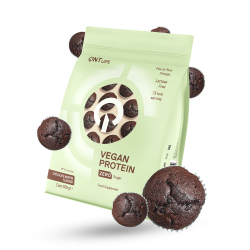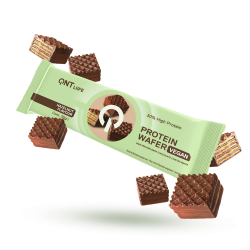Vegan proteins
You've probably heard of plant proteins. Maybe you're wondering if they can really compete with animal proteins, or maybe you're just looking to diversify your protein sources. Either way, you've come to the right place! These days, more and more people are turning to a plant-based diet or wanting to reduce their consumption of animal products. Vegan protein is the solution for people who don't want to consume proteins of animal origin or those containing lactose and gluten. Here you will find our range of vegan products that respect your values and diets to help you maintain and improve your fitness.
There are 3 products.
A protein for everyone.
Protein intake is essential for maintaining and developing muscles. While the majority of dietary proteins come from animal sources, proteins from plant sources are becoming increasingly popular. The most popular are derived from peas and rice, and vegan protein is the ideal alternative to protein derived from cow's milk. Vegetable proteins do not contain all the amino acids in a single source, so you need to make sure you mix several of them together to obtain the quantities you need. The blend of these two plant sources, pea and rice, is the perfect mix when it comes to amino acids.
This protein is suitable for vegetarians, vegans and people who are lactose and gluten intolerant. With no added sugar and easy to digest, vegan protein will provide you with all the nutrients you need to maintain and grow muscles. This plant-based protein is derived from foods that are naturally rich in protein. Vegan protein is suitable for helping you build muscle, but is not derived from an animal source.
Know more about vegan proteins.
Proteins are the building blocks of life, essential for tissue construction and repair. While most people associate protein with meat and dairy products, did you know that plants can also be an excellent source of this vital nutrient? Yes, you heard right! Plant proteins come from sources such as legumes, cereals, nuts and seeds, and even some green vegetables.
Why are vegan proteins so popular?
The popularity of plant proteins has exploded in recent years for a number of reasons:
- Animal ethics: More and more people are looking to reduce or eliminate their consumption of animal products for ethical reasons.
- Environmental impact: Plant proteins generally have a smaller carbon footprint than animal proteins.
- Health: Studies have shown that plant proteins can offer the same benefits as animal proteins, without some of the risks associated with meat consumption, such as heart disease and certain types of cancer.
Advantages of vegan proteins over animal proteins.
- Complete nutrition: Contrary to popular belief, many plant protein sources are complete, meaning they contain all the essential amino acids your body needs.
- Fibre-rich: Plant protein sources are often high in fibre, which is great for digestion and can help you feel fuller for longer.
- Low in Saturated Fat: Plant proteins generally contain less saturated fat than animal proteins, which is beneficial for heart health.
So, ready to dive into the fascinating world of plant proteins? Hold on tight, because this journey promises to be rich in discovery and flavour!
Vegan Proteins: Sources, Benefits, Precautions.
Protein is an essential part of any diet, and there's a common misconception that vegan diets lack this essential macronutrient. However, plant proteins are not only abundant, they also offer additional health benefits that their animal counterparts may not.
Vegan protein sources.
- 1. Pulses: Beans, lentils and chickpeas are excellent sources of protein. For example, 100 grams of lentils contain around 9 grams of protein.
- 2. Cereals: Quinoa, oats and brown rice are rich in protein and can be easily incorporated into a variety of meals.
- 3. Nuts and seeds: Almonds, cashews and chia seeds are not only rich in protein, but also in omega-3 fatty acids.
- 4. Soya products: Tofu, tempeh and soya milk are sources of complete protein, which means they contain all the essential amino acids.
Nutritional benefits.
- Body weight: Vegan diets tend to have a lower body mass index (BMI), which may be associated with a lower risk of chronic disease.
- Heart health: Plant proteins are often lower in saturated fat, which is beneficial for heart health.
- Satiety: Foods rich in plant protein are often also high in fibre, which can help you feel fuller for longer.
- Disease risk reduction: A diet rich in plant protein has been linked to a reduced risk of several chronic diseases, including heart disease and some types of cancer
Precautions.
- Nutritional deficiencies: It is important to note that not all vegan diets are created equal. A poorly planned vegan diet can lead to deficiencies in vitamin B12, iron and omega-3s.
- Combining foods: As some plant protein sources can lack certain essential amino acids, it's important to combine different protein sources in your diet.
Vegan proteins are not only a viable alternative to animal proteins, but they also offer a range of health benefits. Whether you're vegan for ethical, environmental or health reasons, it's entirely possible to maintain a protein-rich diet without compromising your nutritional needs.
Different Sources of Vegan Proteins
Pulses: Protein champions.
Pulses are often regarded as the mainstay of plant proteins. Black beans, lentils and chickpeas are all packed with protein. For example, one cup of cooked lentils provides around 18 grams of protein. What's more, pulses are also an excellent source of fibre, which helps with digestion and satiety. You can use them in salads, stews or even turn them into delicious vegan burgers.
Cereals: Not just for breakfast.
When we think of cereals, the image of breakfast often springs to mind. But did you know that cereals like quinoa, oats and brown rice are also excellent sources of protein? Quinoa, for example, contains all nine essential amino acids, making it a complete protein. One cup of cooked quinoa contains around 8 grams of protein.
Nuts and seeds: Small but mighty.
Nuts and seeds may be small, but they are nutritional bombs. Almonds, cashews and chia seeds are particularly rich in protein. A 28-gram portion of almonds contains around 6 grams of protein. What's more, they're an excellent source of healthy fats and vitamin E.
Soya-based products: The all-rounder.
Soya is perhaps the most versatile source of plant protein. Tofu, tempeh and soya milk are just some of the soya-based products that can enrich your diet. Tofu, for example, contains around 8 grams of protein per 100 gram serving and can be used in a variety of dishes, from stir-fries to smoothies.
Superfoods : Spirulina, hemp and more.
And let's not forget superfoods like spirulina and hemp seeds. One tablespoon of spirulina contains around 4 grams of protein and a host of nutrients. Hemp seeds, meanwhile, contain around 9.5 grams of protein in a 3-tablespoon serving.
Amino acids in sufficient quantity.
If you are a person who does not consume protein of animal origin, you should know that vegan protein will provide you with the necessary quantities of essential amino acids, provided you choose their source carefully. Vegan protein is just as effective as animal-source protein for muscle recovery and building. There's no one protein that's better than another, you just have to find the one that's right for you!
Sport and Veganism: A Winning Duo for Performance and Health
Have you ever wondered whether veganism and sport go well together? The answer is a resounding YES! Let's explore together how a vegan diet can not only support but also improve your sporting performance. Ready to go? Let's get started!
The Myth of Animal Proteins.
One of the biggest myths circulating in the world of sport is that animal proteins are essential for gaining muscle and improving performance. However, an increasing number of studies and testimonials from top athletes show that plant proteins can be just as effective. Legumes, cereals, nuts and seeds are excellent sources of protein that can help you achieve your sporting goals.
Nutrition: The Power of Plant Proteins .
Nutritional benefits.
- Nutrient richness: Plant proteins are often accompanied by fibre, vitamins and minerals. For example, lentils are rich in iron, an essential mineral for endurance.
- Digestibility: Plant proteins are generally easier to digest. This means less bloating and faster recovery.
- Diversity: The abundance of plant protein sources allows greater diversity in your diet, which is excellent for intestinal health. What to Consume
- Before Training: Opt for complex carbohydrates such as oats or sweet potatoes, accompanied by a protein source such as tofu.
- After Training: A smoothie made with almond milk, banana and pea protein can be a great recovery option.
Top-level vegan athletes.
Athletes such as Lewis Hamilton in Formula 1 and Venus Williams in tennis have adopted a vegan diet to improve their performance and recovery. They are living proof that veganism can be compatible with top-level sport.
Vegan Supplements: A Necessity?
If you're a serious athlete, you might need supplements like B12 or algae-based omega-3s. However, most nutrients can be obtained from a well-planned vegan diet.
Veganism and sport are not only compatible, but they can also be a powerful duo to improve your performance and health. With the right planning and food choices, you can reach new heights while being aligned with your ethical and environmental values.


